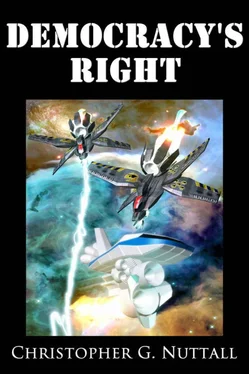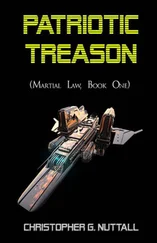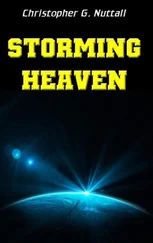Jackson looked up suddenly. “My Lady,” he said, “we are receiving a transmission.”
Hannelore braced herself. There would be no hiding the fact that she was a woman now, or the fact that there were other women on the platform. “Put it through,” she ordered. “Let’s hear what they have to say.”
A face appeared in front of her. The image was massive, as if the sender was focusing the camera directly on his face, rather than allowing her a chance to see his bridge. The man had long blonde hair — longer than her hair — and a beard that seemed to defy any hope of organising it properly. The effect seemed to create the impression of a dashing rogue, although it was partly spoiled by the fact she could see every motion on the face. If the speaker frowned, or twitched, she would see it.
“Lady Ellicott-Chatham,” the speaker said. Hannelore’s lips twitched. Technically, she was Lady Hannelore, for there was no Ellicott-Chatham Family. The failure of the planned merger and her parents’ separation had seen to that. Indeed, someone of a legalistic bent could make a convincing case that she shouldn’t even be considered a Lady at all. “I am Captain Jason Cordova, representing the Popular Front for the Reform of the Empire.”
“That’s a bit of a mouthful,” Hannelore said, before she could stop herself. There was something about the speaker, Captain Cordova, that seemed to encourage informality. If nothing else, it certainly suggested that he didn’t have looting, raping and pillaging in mind. “I have never heard of the Popular Front.”
“The whole universe will know of us soon,” Cordova promised. His booming voice carried with it unlimited confidence, the kind of confidence that only nature’s aristocrats possessed. Some of the family brats Hannelore had known had it, but it was rare outside the Thousand Families, at least from what she’d seen. Her lips twitched again. She hadn’t seen that much of the galaxy outside the Thousand Families. “I’m afraid that I’m going to have to ask you to surrender your facilities.”
Hannelore felt a sudden hot wave of anger flowing through her, but she clamped down on it mercilessly. There was no point in getting angry, not now. She didn’t quite dare. “You’re talking about wrecking the livelihood of nearly a hundred people,” she said, the strongest argument she dared use. “If you destroy the platforms…”
“We have no intention of destroying the platforms,” Cordova said. “We just wish to remove you and your crew from them for a short period of time, until the war is over.” His voice hardened. “I’m afraid I cannot give you a choice in the matter.”
Hannelore keyed the switch and looked over at Jackson. “Can we resist?”
His shrug was very droll. “We don’t have anything to resist with,” he pointed out. “If we say no, they’ll either open fire or send in their troops to take us prisoner.”
“Very well,” Hannelore said, reopening the channel. There was no point in asking for guarantees, although even she had heard of Cordova’s reputation. He didn’t have anything like the reputation some pirates had. “We will transfer over to your ship and then seal the platforms.”
* * *
An hour later, she found herself breathing in clean air as she stepped onboard the Random Numbers . Not all of her crew had been keen to surrender, but spacers couldn’t allow themselves any delusions about reality and reality was that Cordova had the firepower to make any objections pointless and futile. Hannelore had considered trying to sneak away, using only gas thrusters in hopes of avoiding their radar, yet she’d ended up dismissing the idea. It simply wouldn’t have worked.
“Welcome aboard,” Cordova said. On the screen, he’d been remarkable; in person, he was striking, even stunning. His smile was so bright that it seemed to light up his entire face. It was easy to see why his crew both loved and followed him, even into exile and certain sentence of death if they were caught. “I have taken the liberty of preparing quarters suitable for one of your exalted rank and station.”
“Thank you, but I would prefer to bunk with my crew,” Hannelore said. She had long ago lost the modesty that a young girl in the High City on Earth was required to develop — or at least pretend to develop. “I wish to make sure that they are not mistreated.”
“No one will be mistreated,” Cordova assured her. His smile grew wider. “And perhaps you would join me for evening dinner. There is much that you can tell me about Earth.”
Hannelore blinked in confusion. Why would Cordova want to know about Earth?
“I would be honoured,” she lied. It was quite possible that Cordova wanted to take her to bed instead. It wouldn’t be that uncomfortable — it wasn’t as if she were a virgin, or that he was unattractive — but it would have felt like she was betraying her crew. “And then you can tell me all about the Popular Front.”
Her father had told her, once, to learn everything she could. Knowledge was power, he’d told her, and power was always worth having. If she was to be Cordova’s guest — or prisoner — she might as well learn what he had to tell her, and how he intended to justify himself to the universe.
And besides, it might be fun.
“I would be delighted,” Cordova said. “Shall we say my quarters, at nine?”
Commander Khursheda Ismoilzoda — now a Commodore in the rebel fleet — knew that others saw her as prim and unimaginative. It was an appearance she had taken pains to cultivate, if only because — as a young, unattached and attractive female officer in the Imperial Navy — it provided a form of protection. The young sharks — high-ranking officers intent on cutting a romantic swath through lower-ranking officers and crew — could be discouraged if one looked stern enough. It had helped her rise — if slowly — through the ranks and had marked her as a safe pair of hands. Her tactic had worked until she had refused the wrong person and had been banished to Jackson’s Folly.
Unlike Colin, who had personal reasons for rebelling against the Empire, Khursheda had grown up on Earth and learned to despise the Empire from a very early age. Earth’s teeming billions lived in poverty, a poverty only made worse by the fact that their social superiors refused to allow them any chance to make their own decisions. The poor lived their lives without hope and, whenever they fell afoul of the Empire’s laws, found themselves exiled into space. It was no wonder that there were so many applicants for newly-opening colony worlds… and that the Empire had logistical problems shipping so many people off-world. Millions departed Earth each year, only to be replaced by millions more born to poor and hopeless mothers. The poverty trap was grinding and almost unbeatable. Khursheda had beaten it by joining the Imperial Navy as a young girl and excelling in her training, to the point where she had been granted a commission and the chance to rise within the Navy.
As far as she knew, however, she was the last survivor of her family. Her parents had died when she was very young, killed in one of the endless gang wars that raged through Earth’s teeming cities. Two of her brothers had been killed by the Blackshirts — she still didn’t know why, despite searching though Stacy Roosevelt’s files — and three of her sisters had been sold into sexual slavery by the time they reached their menses. They’d been lucky. Khursheda knew that there were children, boys and girls who were barely born, sold into slavery. And her sisters, like so many others, had been worn out and killed by their new job. Their pimps hadn’t cared; they’d just gone on to the next few girls, of which there was an inexhaustible supply.
Читать дальше












